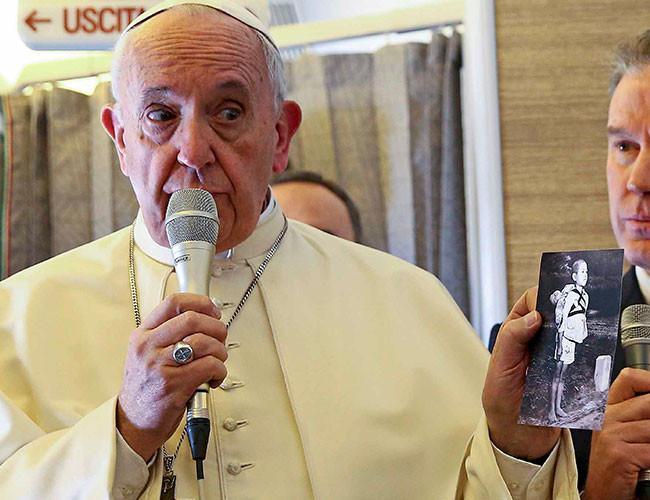
Pope Francis said on Jan. 15 he was really afraid about the danger of nuclear war and that the world now stood at “the very limit.”
His comment, made as he flew off for a visit to Chile and Peru, came after Hawaii issued a false missile alert that provoked panic in the U.S. state and highlighted the risk of possible unintended nuclear war with North Korea.
Asked if he was worried about the possibility of nuclear war, Pope Francis said: “I think we are at the very limit. I am really afraid of this. One accident is enough to precipitate things.”
He did not mention Hawaii or North Korea.
Pope Francis has often flagged the danger of nuclear warfare and in November he appeared to harden the Catholic Church’s teaching against nuclear weapons, saying countries should not stockpile them even for the purpose of deterrence.
As reporters boarded his plane bound for Chile, Vatican officials handed out a photograph taken in 1945 that shows a young Japanese boy carrying his dead brother on his shoulders following the U.S. nuclear attack on Nagasaki.
“I was moved when I saw this. The only thing I could think of adding were the words ‘the fruit of war’,” Francis said, referring to a caption put on the back of the image.
“I wanted to have it reprinted and distributed because an image like this can be more moving than a thousand words. That is why I wanted to share it with you,” he said.
Pope Francis started a trip to Chile and Peru on Jan. 15, attempting to inject new confidence in the staunchly Catholic countries where the Church’s credibility has been severely damaged by sexual abuse scandals.
On his visit to Peru, the second leg of the Jan. 15-22 tour, Francis will also find a destabilizing political corruption crisis has reopened wounds from one of the country’s darkest periods of human rights abuses.
In Chile, where the Argentine pope arrived on Jan. 15 night, Catholics have planned daily protests against his 2015 appointment of Bishop Juan Barros to head the small diocese of Osorno, a small city south of the Chilean capital.
Barros has been accused of protecting his former mentor, Father Fernando Karadima, whom a Vatican investigation in 2011 found guilty of abusing teenage boys over many years. Karadima has denied the allegations and Barros said he was unaware of any wrongdoing.
The situation for the Church was complicated last week by the leak in Chile of a 2015 letter from the pope to local bishops showing that the Vatican had planned to ask Barros to take a one-year leave at the end of his previous post in 2014. That plan went awry and Barros was appointed to Osorno.
“The Church in Chile, which during the dictatorship of Augusto Pinochet enjoyed great prestige for its courageous defense of justice and human rights, has today lost much of its credibility with public opinion,” wrote papal biographer Andrea Tornielli.
A poll by Santiago-based think tank Latinobarometro this month showed that the number of Chileans calling themselves Catholics fell to 45 percent last year, from 74 percent in 1995.